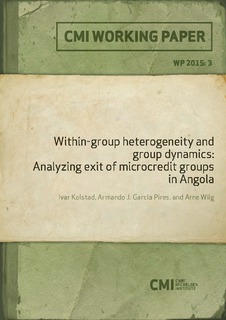| dc.contributor.author | Kolstad, Ivar | |
| dc.contributor.author | Pires, Armando J. Garcia | |
| dc.contributor.author | Wiig, Arne | |
| dc.date.accessioned | 2018-01-04T08:20:24Z | |
| dc.date.available | 2018-01-04T08:20:24Z | |
| dc.date.issued | 2015-03-01 | |
| dc.identifier | oai:www.cmi.no:5405 | |
| dc.identifier.citation | Bergen: Chr. Michelsen Institute (CMI Working Paper WP 2015:3) | |
| dc.identifier.isbn | 978-82-8062-522-9 | |
| dc.identifier.issn | 0804-3639 | |
| dc.identifier.uri | http://hdl.handle.net/11250/2475104 | |
| dc.description.abstract | The effect of within-group heterogeneity on the survival of social groups is theoretically ambiguous. A greater diversity of ideas, experience, and networks can have a positive effect on members’ benefits from group membership, but diversity also creates a potential for conflict. This paper presents an analysis of the exit of microcredit groups, using data from Angola. The results suggest that group fragmentation in terms of social identities, or more specifically religious fractionalization, is associated with a greater probability of group exit. Results for within-group economic inequality suggest, however, that inequality is associated with a decrease in the probability of exit, but at a diminishing rate. | |
| dc.language.iso | eng | |
| dc.publisher | Chr. Michelsen Institute | |
| dc.relation | CMI Working Paper | |
| dc.relation | WP 2015:3 | |
| dc.relation.ispartof | CMI Working Paper | |
| dc.relation.ispartofseries | CMI Working Paper WP 2015:3 | |
| dc.relation.uri | https://www.cmi.no/publications/5405-within-group-heterogeneity-and-group-dynamics | |
| dc.subject | Group Dynamics | |
| dc.subject | Microcredit | |
| dc.subject | Fractionalization | |
| dc.subject | Inequality | |
| dc.subject | Exit | |
| dc.subject | Angola | |
| dc.title | Within-group heterogeneity and group dynamics: Analyzing exit of microcredit groups in Angola | |
| dc.type | Working paper | |
| dc.identifier.cristin | 1249207 | |
